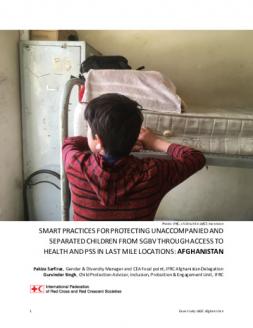The ARCS in collaboration with the IFRC is planning to develop a child protection policy and then conduct orientation sessions for ARCS personnel. The policy and training are intended for all ARCS staff and volunteers including those working on migration, disaster management, health, and psychosocial projects. Having a child protection policy is an essential safeguarding measure to ensure that humanitarian personnel understand how to safely interact with girls and boys, recognize children’s rights, have practical tips to reduce risk of harm, and know where to access help if it is required.
One of the long-standing services of the ARCS is the delivery of five marastoons across the country. The marastoons provide a number of services especially for widows, people living with disabilities, and people with mental health issues. In addition, a main focus is on providing shelter, psychosocial support, health care, and education to children who are alone such as orphans and unaccompanied boys. However, when boys turn 15 years old they are required to leave the marastoons. Although ARCS provides a small financial stipend to help the boys access school, because they have scarce means of sustenance, they rent an apartment or rooms in groups of 4 or 5, often far from the city. The boys do not always choose to go to continue school and are exposed to different risks (political involvement, criminality, etc.).

The objective of the mission was to gather data on Afghanistan as a case study to support the IFRC global study on smart practices for protecting unaccompanied and separated children (UASC) from sexual and gender-based violence (SGBV) through health and psychosocial services in last mile locations.



